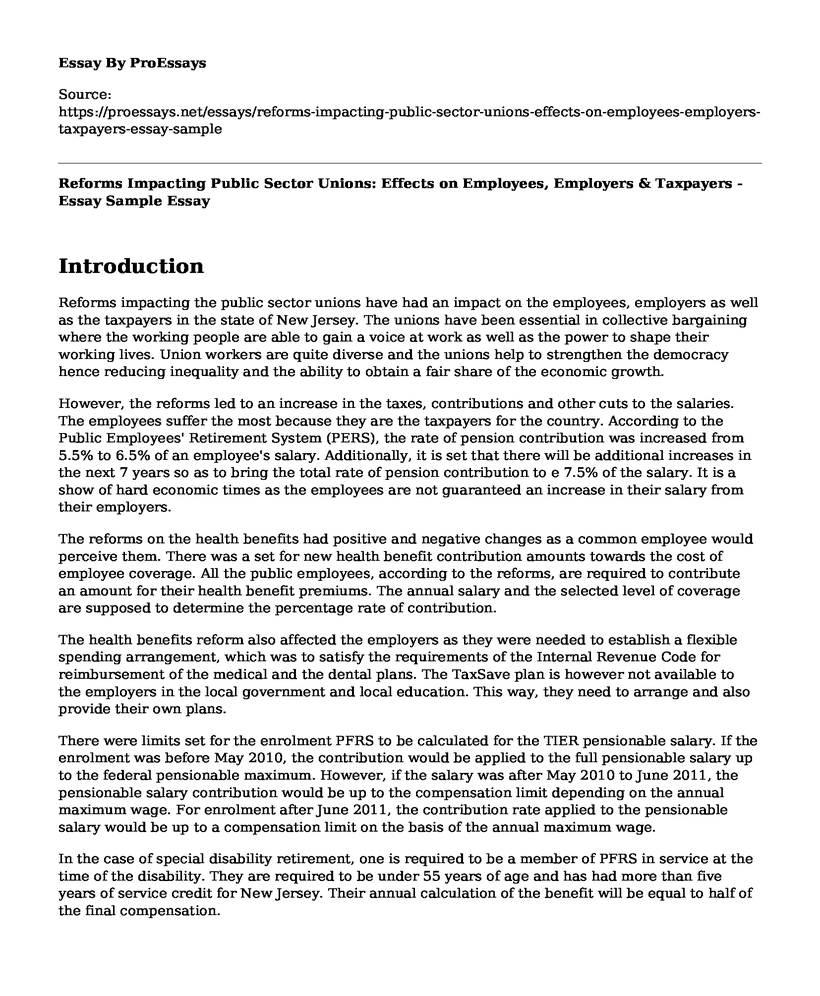Introduction
Reforms impacting the public sector unions have had an impact on the employees, employers as well as the taxpayers in the state of New Jersey. The unions have been essential in collective bargaining where the working people are able to gain a voice at work as well as the power to shape their working lives. Union workers are quite diverse and the unions help to strengthen the democracy hence reducing inequality and the ability to obtain a fair share of the economic growth.
However, the reforms led to an increase in the taxes, contributions and other cuts to the salaries. The employees suffer the most because they are the taxpayers for the country. According to the Public Employees' Retirement System (PERS), the rate of pension contribution was increased from 5.5% to 6.5% of an employee's salary. Additionally, it is set that there will be additional increases in the next 7 years so as to bring the total rate of pension contribution to e 7.5% of the salary. It is a show of hard economic times as the employees are not guaranteed an increase in their salary from their employers.
The reforms on the health benefits had positive and negative changes as a common employee would perceive them. There was a set for new health benefit contribution amounts towards the cost of employee coverage. All the public employees, according to the reforms, are required to contribute an amount for their health benefit premiums. The annual salary and the selected level of coverage are supposed to determine the percentage rate of contribution.
The health benefits reform also affected the employers as they were needed to establish a flexible spending arrangement, which was to satisfy the requirements of the Internal Revenue Code for reimbursement of the medical and the dental plans. The TaxSave plan is however not available to the employers in the local government and local education. This way, they need to arrange and also provide their own plans.
There were limits set for the enrolment PFRS to be calculated for the TIER pensionable salary. If the enrolment was before May 2010, the contribution would be applied to the full pensionable salary up to the federal pensionable maximum. However, if the salary was after May 2010 to June 2011, the pensionable salary contribution would be up to the compensation limit depending on the annual maximum wage. For enrolment after June 2011, the contribution rate applied to the pensionable salary would be up to a compensation limit on the basis of the annual maximum wage.
In the case of special disability retirement, one is required to be a member of PFRS in service at the time of the disability. They are required to be under 55 years of age and has had more than five years of service credit for New Jersey. Their annual calculation of the benefit will be equal to half of the final compensation.
Generally, the reforms have had positive and negative impacts. Employees increased contribution is something to worry about because they are already struggling with the salary and may find it harder when they are required to contribute more without the increase. The employers will suffer fewer profits if they have to pay their workers more for these reforms. However, the reforms will generally help to ensure more benefits for an individual and a better saving culture.
Cite this page
Reforms Impacting Public Sector Unions: Effects on Employees, Employers & Taxpayers - Essay Sample. (2023, Mar 14). Retrieved from https://proessays.net/essays/reforms-impacting-public-sector-unions-effects-on-employees-employers-taxpayers-essay-sample
If you are the original author of this essay and no longer wish to have it published on the ProEssays website, please click below to request its removal:
- A Rhetorical Analysis on Sarah Smarsh Research Findings
- The Constitution, The Bill Of Rights, And The Amendments
- Essay Sample on How Policy Can Affect Public and Private Healthcare in this Country
- Annotated Bibliography: Is Abortion Ethically Right?
- Essay Sample on John Snow: An Icon of Humanitarianism and Societal Change
- Paper Sample on Technology Destroys More Jobs Than It Creates
- Essay on Strategic Policy Framework for Enhancing Cancer Care: Maximizing Quality, Minimizing Cost







